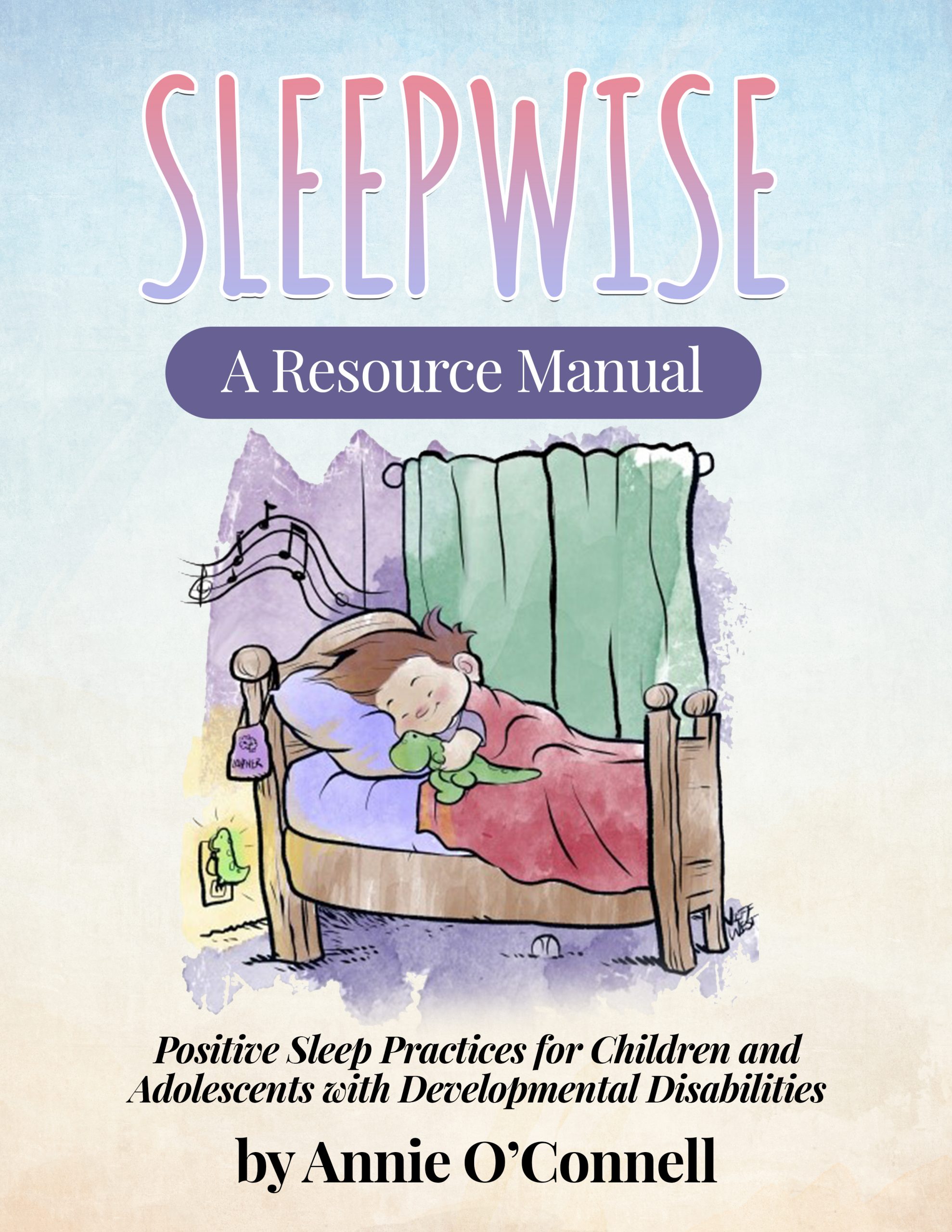Sleep with Disability Webinars Series
The Sleep with Disability Webinar Series (N=6) is aimed for the allied health and educational professionals working in the home and local community with families of children and adolescents with developmental disabilities and sleep disturbance. The webinars are intended to provide information as presented in the two day training for allied health and educational professionals conducted by Annie O’Connell MAppSC (OT) since 2005. The training has evolved from clinical experience, training participants’ feedback, an overseas Churchill Fellowship and research.
Parent training as a sleep intervention is receiving increasing attention where parents take on the role of co-clinician in planning and implementing the child’s intervention (1,2,3). The Sleep with Disabilities Webinar Series provides detailed information on how to develop an unique sleep plan with families with individualized goals, things to do during the day, night routine, combination of communication, sensory and behavioural strategies and reinforcement. Children who present with medically related sleep issues require referral to an appropriate medical health professional.
Practitioners who undertake this training will be able to:
Understand the stages and cycles of sleep and need for sleep.
Interpret sleep diaries.
Appraise a sleep history.
Identify possible sleep disturbance.
Recognise indicators for referral to specialised services.
Consider a child and family’s readiness to commence intervention to reduce sleep disturbance.
Review strategies to reduce sleep disturbance.
Develop a sleep plan based on communication, sensory and behavioural strategies.
Set sleep goals.
Monitor and adapt a sleep plan.
The six webinars cover the following topics:
Sleep Education
Prevalence & Types of Sleep Disturbances; Use of Screening tools, Sleep Diary & Sleep Interview
Preparation for a Sleep Plan; Establish a routine; Behavourial strategies Part A and Case Studies
Behavioural strategies Part B; Communication Strategies Resources and Case Studies
Sensory strategies – light therapy ; Positive Reinforcement; Goal setting:
Selecting a Sleep Strategy; Monitoring Sleep Plans; Sleepwise Research; N=50 Case Studies
While each webinar is approximately 45 minutes in duration you are asked to pause the webinar while activities are completed either individually or in small groups. For example in Webinar One there are two activities – calculating your average sleep and compiling the pros and cons of co-sleeping. Please allow extra time for the activities. The webinars will include examples of published case studies, 50 clinical case studies and resources.

PRESENTER
Annie O’Connell is an occupational therapist with over 30 years of experience and has worked in a variety of paediatric settings in Australia and overseas.
In 2003 Annie completed her M.App.Sc (OT) by research investigating ‘Sleep Disturbance in Children with Autism and the use of a Waterbed’.
From 2003 to 2015 Annie was the Lead Practitioner for the ‘Sleepwise project’ addressing sleep disturbance in young people with developmental disabilities developed by Child and Youth Services, Disability Services in SA. Two research grants from the Apex Foundation For Research Into Intellectual Disability Limited allowed the evaluation of the Sleepwise approach for children 2–6 years of age and 8–18 years of age.
Annie was awarded a Churchill Fellowship in 2009 to further explore the management of sleep disturbance in the UK, USA and Canada.
Annie facilitates training interstate under ‘SleepAbility’ www.sleepability.com.au/
REFERENCES
- Moss, Gordon & O’Connell (2014) Impact of Sleepwise: An Intervention for Youth with Developmental Disabilities and Sleep Disturbance. Journal of Autism and Developmental Disorders 44(7): 1695-1707
- Johnson et al (2013) Behavioral parent training to address sleep disturbances in young children with autism spectrum disorder: A pilot trial. Sleep Medicine 14 (10)
- Hiscock et al (2015) Impact of a behavioural sleep intervention on symptoms and sleep in children with attention deficit hyperactivity disorder, and parental mental health: RCT. British Medical Journal 350
Improvement of Skills & Knowledge after completing the Sleep with Disability Webinar series
Below are the results of a sample group of participants before and after the webinar series online training.
The pre and post evaluation involved ten questions where participants indicated on a scale 1 to 10 their self-reported knowledge, skill and confidence in this sleep intervention for children and adolescents with developmental disabilities (1 was poor; 10 was good).
The mean (average) score are compared. The combined scores indicated an increase of knowledge, skill and confidence in this sleep intervention from 34.97% to 78.4% – approximately increase of 43% following the online training.
| Pre Evaluation | Post Evaluation | |
|---|---|---|
| Knowledge of the stages and cycles of sleep and need for sleep | 4.6 | 8 |
| Ability to complete and appraise a sleep history | 3.2 | 7.7 |
| Ability to interpret sleep diaries | 3.2 | 7.6 |
| Confidence in identifying possible sleep disturbance | 3.6 | 7.8 |
| Ability to recognize indicators for referral to specialized services | 3.7 | 8.1 |
| Ability to consider the factors affecting the child and family’s readiness to commence intervention to reduce sleep disturbance | 4 | 8.3 |
| Knowledge of how sleep is studied | 3.2 | 7.7 |
| Knowledge and confidence to develop a sleep plan based on behavioural, sensory and communication strategies and setting goals with families | 3.1 | 7.9 |
| Ability to monitor and adapt a sleep plan | 3 | 7.8 |
| Current knowledge, skill and confidence to work with individual families to reduce sleep disturbance in children and adolescents with a developmental disability | 3.2 | 7.7 |
| Total | 34.98 | 78.7 |

